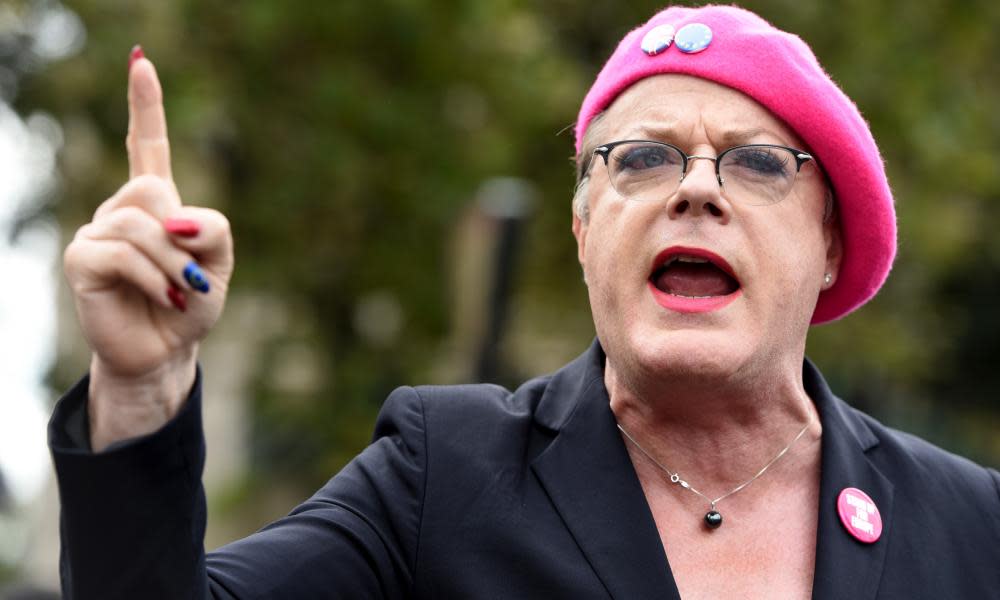Stop engaging with online trolls altogether, public figures say

Actors, television personalities and politicians are calling on their colleagues to stop giving fuel to online trolls in an effort to stop the spread of hate and abuse online.
The former England footballer Gary Lineker, the former home secretary Alan Johnson, the London mayor, Sadiq Khan, the anti-FGM campaigner Nimco Ali and the comedian and actor Eddie Izzard are among those uniting on Monday to advise people to stop engaging with trolls altogether online.
Izzard told the Guardian that acknowledging them was to effectively hand over a “megaphone” so they could spread their views to an even larger audience.
Related: Abuse of MPs hitting unprecedented levels, says Met police chief
The call by these public figures is part of the launch of a new guide for victims of online trolling called Don’t Feed the Trolls, launched by the new Center for Countering Digital Hate (CCDH).
Johnson told the Guardian that MPs were now afraid of raising certain subjects likely to lead to them being trolled.
He said: “Many of my former colleagues in parliament fear speaking out on issues which might trigger another onslaught of trolling.
“I worked with the CCDH’s director, Imran Ahmed, on the EU referendum campaign, in which we saw outbreaks of virulent hate offline and especially online, and in which our colleague Jo Cox lost her life to a radicalised white nationalist terrorist.
“The CCDH’s Don’t Feed the Trolls report is a brilliant explanation of how we can start the process of cleaning up toxic discourse on social media so we can use it to do good.”
Izzard, who has previously spoken about receiving abuse for being transgender, said: “To directly engage with these trolls is to hand them a megaphone.
“The world would be a happier and less hateful place if, instead of giving these voices the attention and audience they crave, we all simply blocked and ignored them.”
Co-authored by the psychologist Dr Linda Papadopoulos and Ahmed, the report tells victims to block troll accounts and turn off notifications on their phones when they are being targeted.
The public figures backing the report believe responding to trolls on social media – even with a put-down or criticism – spreads hate by amplifying and legitimising their ideas. It also helps trolls attract new followers, and access an audience they would not normally be able to reach.
The guidelines suggest that in cases where victims receive messages which they believe may be unlawful, they should record a screenshot of the message, report it to the social media platform, and contact the police or lawyers. It also advises not to post about being the target of trolls.
The report references a playbook produced by the US neo-Nazi website The Daily Stormer, advising online trolls that the best way to gain “media attention and general infamy” was “to troll public figures and get them to whine about it”.
The research also cites evidence that trolls are more likely to have personality traits in which they enjoy seeing other people in pain, and so responding or complaining often leads to more abuse.
Lineker, host of the BBC’s Match of the Day, said recent incidents of racism directed at black footballers online showed the urgent need for the guide.
“We’ve all been shocked by the way in which racist trolls have been targeting footballers recently. It is frankly horrifying that they have done so in a calculated way to spread their abhorrent views. Let’s not allow the beautiful game to be tarnished in this way.
“Everyone across the sporting world will be grateful for this guide on how we can show online trolls the red card: don’t rise to the bait; block the trolls; and take some time out.”
Papadopoulos said: “It is perfectly natural for a victim of trolling to want to defend their reputations and values. But it is precisely this instinct that trolls exploit to keep victims engaged and to amplify their hate.”

 Yahoo News
Yahoo News 
